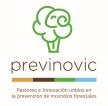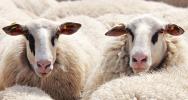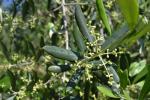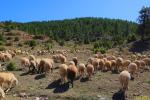
AGRI-ROVENAT Operational Group: Sustainable crops in areas with difficult orography and severely affected by depopulation
- Type Operational group
- Status In progress
- Execution 2024 -2027
- Assigned Budget 598.225,45 €
- Scope Supraautonómico
- Autonomous community Asturias, Principado de; Galicia; Madrid, Comunidad de
- Main source of financing CAP 2023-2027
- Project website GO AGRI-ROVENAT
The project will be carried out on two traditional agricultural crops (vines and olive trees) and another crop that has recently been introduced in Spain (an old rose used in the perfume industry). The aim is to enhance the beauty of the landscape through agriculture, using sustainable farming, and to enable this activity to give rise to new complementary proposals, framed within the concept of a circular economy.
Both grape and olive cultivation are subject to very strict European legislation regarding the description, registration, and recognition of each variety grown. The project is being developed in sparsely populated and difficult-to-reach areas of northern Spain, where they currently represent the only profitable alternative capable of attracting population. Work will also be done with another crop newly established in Spain. The project includes the use of certified robots and the method of creating induced aversion in sheep, which offers full guarantees for animal health and welfare.
- Selection, marking and preparation of production plots.
- Marking of 3 sectors or subzones in a vineyard, in an olive grove and a rose farm.
- Selection, marking and preparation of new plots (Rosa Narcea).
- Induction of aversion to sheep.
- Duration of the induced aversion.
- Testing the duration of the aversion to vines, olives, and roses. Reinforcing the aversion if necessary and maintaining the sheep.
- Control the natural vegetation cover in the plots of the three agricultural resources, using sheep with induced aversion to vines, olive trees, and roses.
- Monitoring natural vegetation cover in plots across the three agricultural resources using remote-controlled robots. Cumulative effect on natural vegetation cover.
- Effect of robot use, sheep, and sheep droppings on grape ripening, quality (sugars, acidity, polyphenols, aromas), and the incidence of fungal diseases (mildew, powdery mildew, and botrytis) in grapevines. Insemination and gestation of sheep.
- Ensure that the sheep used in each trial become pregnant at least twice and are able to produce milk.
- Obtaining differentiated sheep milk, associated with each crop: the vineyard, the olive grove and Rosa Narcea.
Both grape and olive cultivation are subject to very strict European legislation regarding the description, registration, and recognition of each variety cultivated. Some of the varieties included in this project have been described and registered by scientists from the VIOR group. Rosa Narcea was discovered and selected by scientists from the same group. This rose is protected by the CPVO and licensed for exclusive worldwide exploitation by Aromas del Narcea SL.
The vineyard plot included in the study, contributed by Ouro de Quiroga, is part of the Ribeira Sacra Designation of Origin (DO) and subject to its regulations. In the case of Galician olive groves, only Brava Gallega and Mansa Gallega are recognized, and these are the ones planted by Ouro de Quiroga. The Galician Regional Government is studying the possibility of applying for a Designation of Origin for Galician oils. The area of operation for this project would be one of the key areas of said DO. The rose plots already planted and those to be established are located in the Cibea River valley, on currently abandoned "farmland." The work will be carried out using approved robots, which are currently being marketed, with all the necessary permits.
The ISO TC-299 Robotics standardization committee has recently published the UNE-EN ISO 13482:2014 standard, which defines the safety requirements for non-industrial personal assistance robots, and the ISO 18646-1 Performance criteria and testing methodology for service robots. However, these standards are clearly geared toward indoor robots. The agricultural robots included in this study are remote-controlled and therefore human-controlled. The method for creating induced aversion in sheep offers full guarantees regarding animal welfare and health. This method, as well as the handling and care of the sheep participating in the project, will comply with the recent Animal Welfare Law, in force since September 29, 2023 (BOE No. 75, March 29, 2023).
For the milks included, Royal Decree 1086/2020 of December 9, 2020, on the conditions for applying the European Union provisions on hygiene in the production and marketing of food products and any other regulations in force regarding this product of animal origin will be taken into account.
The effectiveness of new methods for maintaining natural vegetation cover (remote-controlled robots and sheep with an induced aversion to vines, olive trees, and roses) will be tested for the development of profitable and environmentally friendly crops in areas with difficult topography (difficult for mechanization), high levels of depopulation (lack of labor), and high landscape value. The differentiated milk produced by the sheep associated with each crop will also be evaluated.
The positive result of maintaining natural vegetation cover through the use of sheep with an induced aversion to grapevines, olive trees, and roses would make the work in these crops much less arduous and affordable for people with limited physical strength (it would avoid manual clearing and herbicide application). It would significantly reduce weed control costs and avoid the use of herbicides that harm the environment.
The results obtained from the study of the milk produced by sheep with induced aversion to grapevines, olive trees, and roses will allow for the provision of differentiated milk based on the vegetation cover of each of the three crops studied in each of the areas. This would create a new source of income in the area and benefit from the sheep, which are also performing a role in maintaining the natural vegetation cover. The positive results obtained from the study with the remote-controlled agricultural robot will allow for the maintenance of vegetation cover in orographically difficult areas and in areas where sheep may have difficulty accessing.
Both systems would complement each other, considerably reducing the maintenance costs of the plots as well as the difficulty of the work that farmers usually have to carry out in these areas. The results obtained on the type of maintenance of the vegetation cover on the quality of the grapes, olives and roses, as well as the products obtained from them (wine/must, olive oil, rose extracts...), will contribute to increasing their value in the market and differentiating them from the rest.
- Coordinator/entity name: CSIC General Foundation
- Postal address: Street/Square and number: Calle Joaquín Costa 12, CP 28002, Madrid (Spain)
- Coordinator/entity email: direccion@fgcsic.es
- Telephone: 609269703
- Fundación General CSIC
- Fundación General CSIC
- Consejo Superior de Investigaciones Científicas (2 centros: MBG e IPLA)
- MILLASUR S.L.U.
- FUNDACIÓN LABORAL DE PERSONAS CON DISCAPACIDAD SANTA BÁRBARA FSP
- Ovejas y Corderos S.L







